#TI-99/4A
Explore tagged Tumblr posts
Text

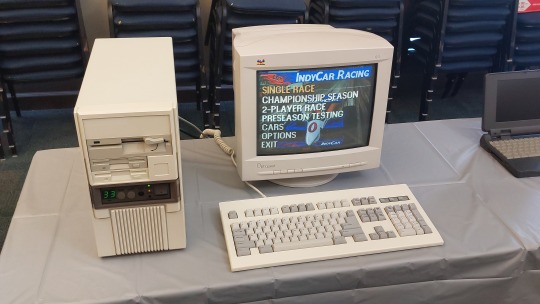

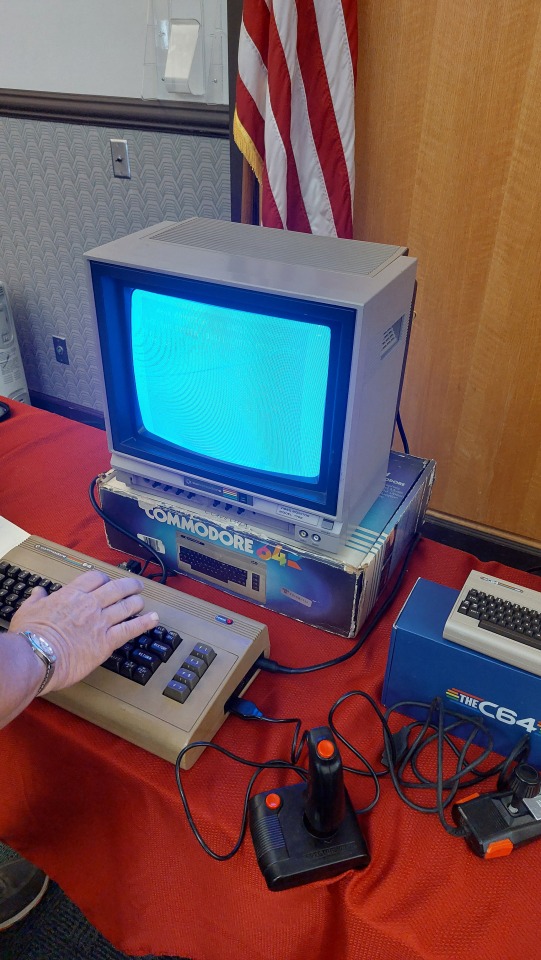


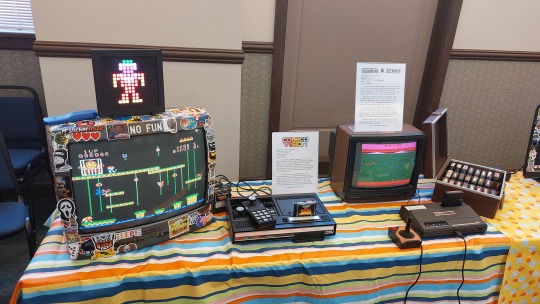
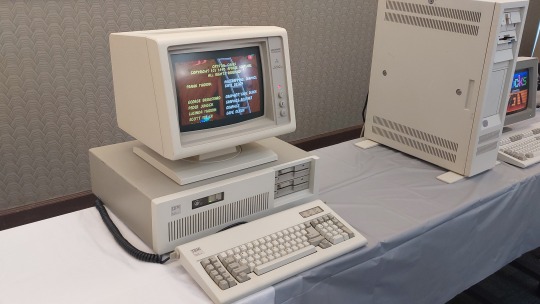




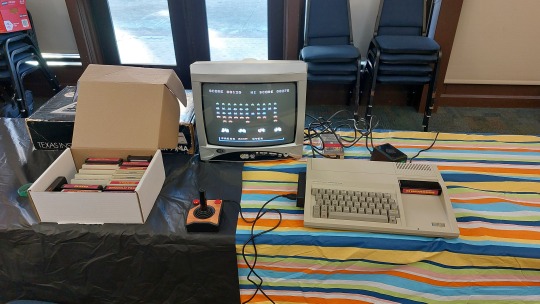
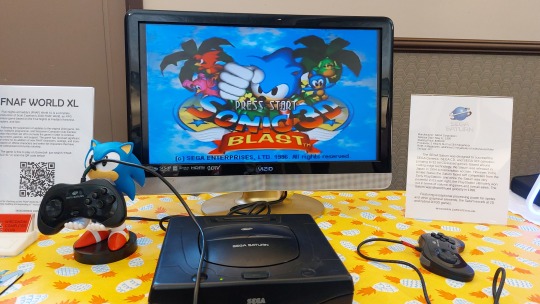
A bunch of photos from the Wisconsin Computer Club's Open House Show on January 20th, 2024 at the Portage County Stevens Point Library, in Stevens Point, Wisconsin. We'll be back here again soon enough, always a great show with a good turnout!
#retro tech#retro gaming#commodore#vintage computer#IBM#retro IBM#retro apple#commodore c16#Atari 5200#Colecovision#sega saturn#TI-99/4A#Pong#Wisconsin Computer Club
487 notes
·
View notes
Text
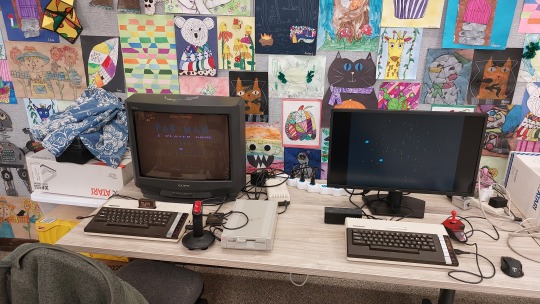
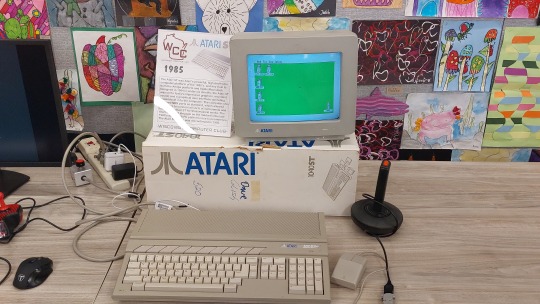

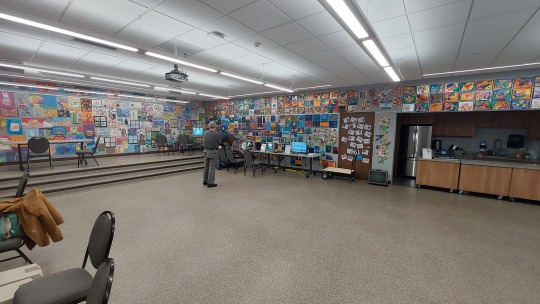
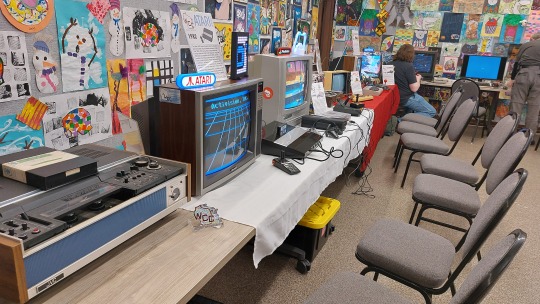
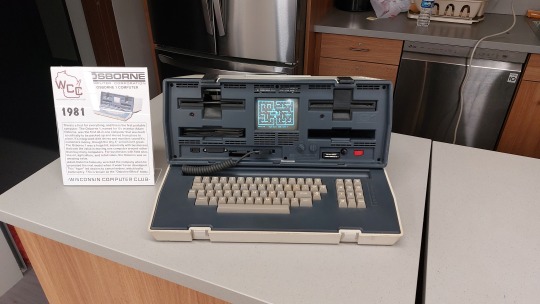
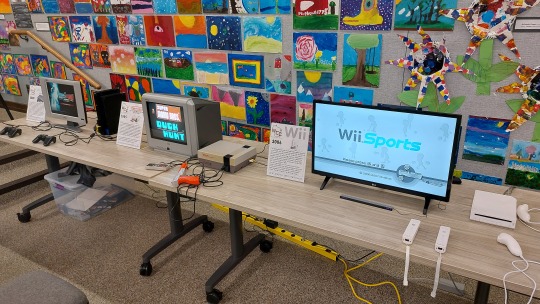
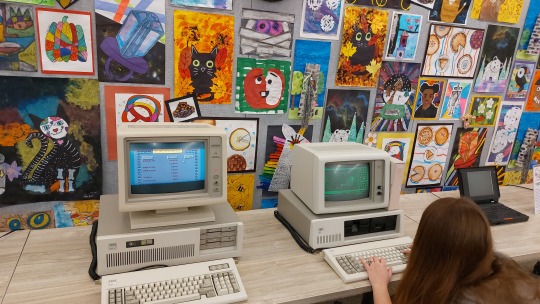
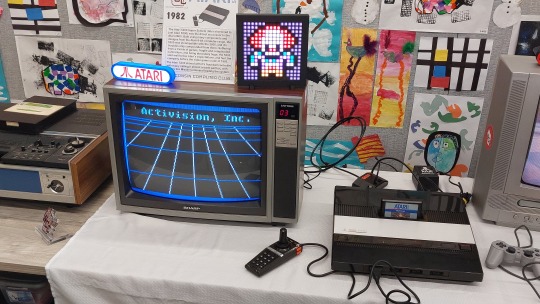

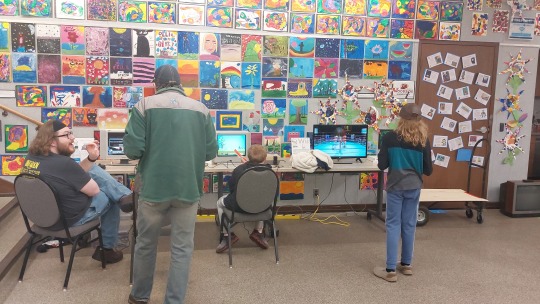

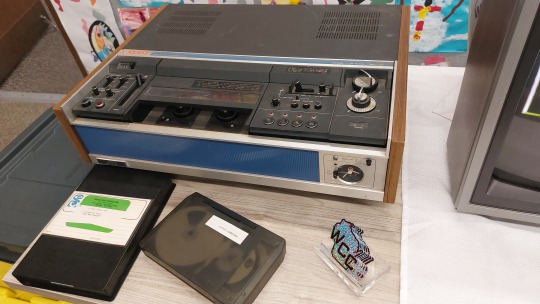
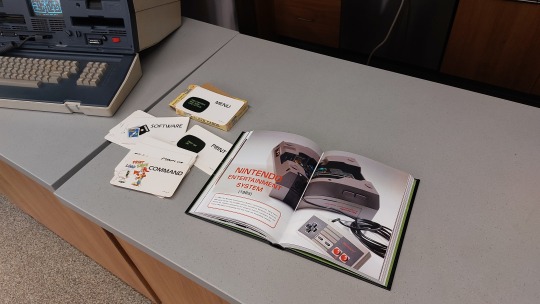


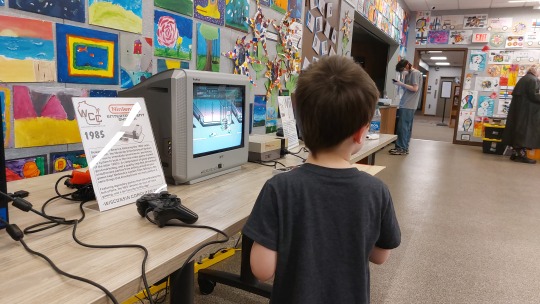
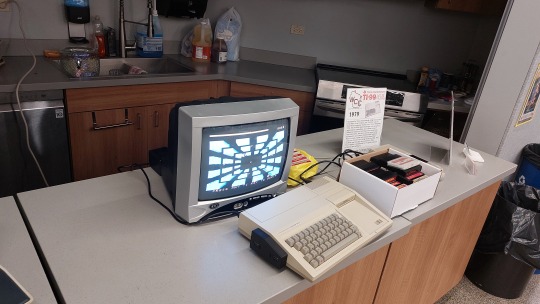

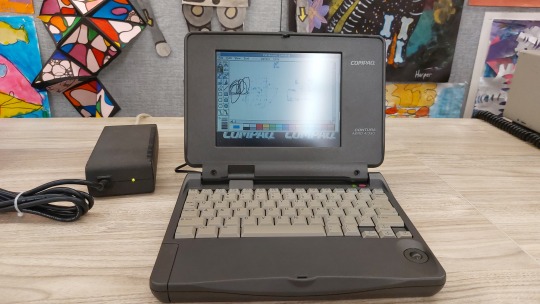
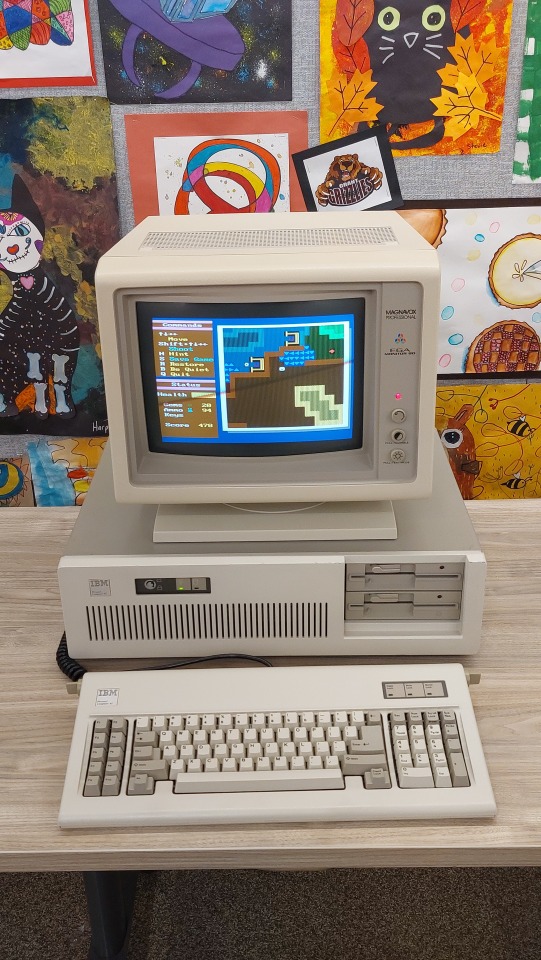
Some photos from the Wisconsin Computer Club's Open House Show in Wisconsin Rapids, Wisconsin on 3.30.24. As usual I got pictures mostly at the start and end of the show when there weren't as many people around. All involved had a great time!
#retro gaming#retro tech#retro consoles#atari#pong#atari 2600#old tv#retro tv#IBM#vintage computing#vintage computer#Nintendo 64#N64#Atari 5200#Atari ST#TI-99/4A#Nintendo Wii
257 notes
·
View notes
Text
Texas Instruments TI-99/4A

The TI-99/4A, released in 1981, was an improved version of the TI-99/4 released in '79. The TI-99/4 series used the Texas Instruments TMS9900 microprocessor, originally used in minicomputers, and was the first 16-bit home computer.
The TI-99/4A was released in June 1981 with a simplified internal design, improved keyboard, improved graphics and a unique expansion system compared to the TI-99/4.
The expansion was aided by the "Peripheral Expansion System" box, which contained hardware accessories.
Unfortunately, Texas Instruments still insisted on full control of the system, so very few programmers made programs and games for the TI-99/4 machines.
This unmarket-friendly practice led to the demise of the machines and TI's exit from the microcomputer market.
More info: wikipedia, howtogeek




11 notes
·
View notes
Text

#Defender#Williams Electronics#Williams#Arcade#Atari 2600#Atari 5200#Colecovision#Intellivision#Commodore 64#Game Boy#TI-99/4A#SAM Coupé#XBox 360#Shoot 'em up#1980#markee
1 note
·
View note
Text
Texas Instruments und seine TI-99 Computer
Vor fast 40 Jahren zog sich Texas Instruments aus dem Heimcomputermarkt zurück. Nach knapp 3 Millionen verkauften TI-99/4A. Warum? Ein spannender Beitrag in meinem Blog digitalesleben.blog

View On WordPress
4 notes
·
View notes
Text
This is going to date me as the eldest of millennials slash young end of Gen X, but: When I was very young, we had a very early home computer in the basement that I've struggled for years to recall details of. ADHD and it getting replaced by better PCs made my memories of this thing very hazy. "Um. Black? Had cartridges? Was black and white WAIT NO that was because we had it hooked up to the 14" black-and-white portable TV my parents had? Had Defender and some text-based Zork-like game?" Not helpful. But I was reminiscing with my dad not long ago and together we FINALLY dredged up enough collective knowledge to identify it!
It was such a strange device—at the intersection of home gaming consoles and home computers, and made for the most corporate of reasons. I don't remember it as well as our first forays into IBM-compatible PCs (where I learned DOS commands, QBASIC and eventually Windows, plus of course first logged in to CompuServe and even made GOPHER calls) but I will always remember that weird little guy with fondness.
0 notes
Text
Shiela Dixon bridges the gap between past and present tech, transforming a Raspberry Pi RP2040 into a vintage Texas Instruments TMS9918A video display processor (VDP). @elektorlabs
0 notes
Text

Moon Patrol para la TI 99/4A por Atarisoft.
36 notes
·
View notes
Note
Tell us, why do you think Commodore failed?
Hoooooo boy... take this with a grain of salt, but here's how I see things based on my incomplete knowledge of the history. I need to do more research on this front, read a few of the books from folks who were there, but here goes nothing:
So, during the calculator wars of the early/mid 1970s, Texas Instruments was knocking competitors out of the game left and right by charging through the nose for the chips they sold. Commodore was one of their customers, and was nearly put out of business as a result. Jack Tramiel's solution was to buy MOS Technologies, effectively putting an end to CBM's reliance on TI's semiconductors because they could suddenly produce their own for much of their big ticket items.
Fast forward to 1981, and Commodore's VIC-20 is in a price war with Texas Instruments' TI-99/4A home computer. Jack kept lowering the price, and TI kept having to do the same to compete, so they were selling at a loss -- against a wildly popular home computer at the time. Jack, ever-vindictive in his motives (business is war, as he liked to say), cut the price of the VIC-20 at a CES show, which killed TI as a competitor in that segment in the market, but he did so at great cost to Commodore.
The way he cut the prices on the VIC also included peripherals, which the various vendors relied on to make their profits. They charged back those losses to Commodore. The result tipped the balance to diminish Jack's position in the company, and Irving Gould ousted him. Jack jumped ship with his sons and went to go work for Atari, selling the ST series machines, which would go on to compete with the Commodore Amiga series.
The problem was that Jack was the big force behind giving the company direction, especially when guiding advertising. The C64 sold itself, which was a blessing and a curse. It meant Commodore never really had to try all that hard to make good ads for it, so when they had to work harder to push later products, they kinda sucked at it. This really hurt the Amiga out of the gate, because nobody knew how to sell this golden child they just acquired, meaning it took many years to find its legs in the market.
Weird side projects continued to build up, and company focus was lost. Engineers churned out some amazing products, but without a guiding force at the top steering the company, and advertising dropping the ball in selling the powerful machines they were creating, the company was already in a slow death spiral. The IBM PC compatibles had already taken hold of much of the market, and were continuing to chip away at Commodore's market share, which wasn't helped by Jack himself fighting the company he founded on the side of Atari. The ST and the Amiga were fighting for the scraps left behind by IBM's juggernaut platform.
Commodore was a dead man walking from the moment Jack just had to get revenge on TI for trying to screw him out of the market in the 70s. It's just that nobody knew what the repercussions would be when he did that...
31 notes
·
View notes
Note
Do you think we're headed for another American Industry crash out like 1983, or has the digital age changed what was a product of physical media? Is the industry turbulence largely on the back end, or is it also rippling to consumers?
There won't be another industry crash like 1983, mostly because most people don't really understand what actually happened in 1983. 1983 wasn't an industry crash, it was an Atari crash because there were too many low-quality games for Atari and the market was totally saturated, causing the players to drop the Atari and go look for something else. The players back then were all penned up on the Atari console only, and post-crash spread out across multiple other platforms that launched at that time like the Commodore 64, Apple 400, Tandy Color Computer (and Color Computer 2), and the Texas Instruments TI-99 4A.

Today's troubles are a combination of many separate variables all causing effects that intersect in very bad ways for industry growth. Interest rate increases make it difficult to borrow money, which makes approving new projects riskier. Tariffs cause economic instability, which can affect projected sales numbers. But the biggest issue is that the industry is effectively correcting itself - there were two years (2020-2021) where the growth in games was taking off like a rocket ship, and many companies saw it and assumed it would continue to grow at that rate. When 2023 rolled around and people realized that the growth projections were totally off, huge numbers of investors pulled their money out to invest it in other things like AI. This meant that publicly traded game companies both lost investment money that they had been expecting to use to pay for new game projects and that they had to cut costs in order to reassure the remaining investors not to follow the early leavers.

This has an overall pendulum swinging back effect of overcorrection where several promising games that would have been successful get cancelled too. That said, this correction will eventually swing toward "good" again as well because it will cause demand for new games left unmet in the market, which will (eventually) entice the game companies to expand and experiment once again. Such things will happen eventually, but it won't happen until things calm down and stabilize first.
[Join us on Discord] and/or [Support us on Patreon]
Got a burning question you want answered?
Short questions: Ask a Game Dev on Twitter
Short questions: Ask a Game Dev on BlueSky
Long questions: Ask a Game Dev on Tumblr
Frequent Questions: The FAQ
13 notes
·
View notes
Text



Released in 1982, Miner 2049er was one of the finest early platformers. Shown above are Atari 400/800 and VCS/2600 screenshots and cartridge.

Apple II

Texas Instruments TI-99/4A
15 notes
·
View notes
Text







Many thanks to all who came to our "Grand Finale" show at the IDEA Center! While we'll miss the old place, the new place will be much nicer for all the things we have in store for the future! Hope to see you there for our "Grand Opening" event in March- you're invited! 🥳
#retro gaming#retro tech#retro consoles#wisconsin#atari#nintendo#sega#Macintosh#Famicom#Dreamcast#Gamecube#Channel F#IBM#Macintosh plus#Wisconsin Computer Club#Stevens Point#TI-99/4A
19 notes
·
View notes
Text
Another nice interview I found, where J.A. Laraque talks with Chris Tremmel about his time working on Boogerman and his fond memories of making games in the 90s.
I've made a copy of the interview below the divider in case the original page ever goes down! There seems to be a bit of an editing goof in the original transcript as well, so I've fixed that in my version.
There are thousands of great games across all platforms that we as gamers have enjoyed for many years of our lives, but what about the people behind them. Just as there are fans of games there are the game makers themselves who weave a concept into code to be displayed on your system of choice. Many times the idea that became the mega-hit game of the year came to the developer or designer in the middle of the night, but from there it was many sleepless nights to turn that vision into reality.
One of Obsolete Gamer’s main purposes is to get the story behind the game and we do this by speaking with the designers, developers and publishers who helped bring us oh so many hours of enjoyment. Sometimes it begins with a gamer profile where we just find out a game they like and from there a dialog starts and soon you find out all kinds of wonderful information.
This is what happened with our gamer profile of Chris Tremmel. I discovered him through his clothing store, Gamer Cultoure and when he submitted his gamer profile with the game BoogerMan I wanted to find out why he liked that game and what I found out was he was one of the main creators of it. After that I had to learn more and Chris was very accommodating in answering our questions.Gamer Cultoure logo
Obsolete Gamer: Let’s start with a little history, what was it that got you into gaming and working in the gaming industry?
Chris Tremmel: When I was a kid, my parents hooked me up with a Texas Instruments\99-4A computer. I was already a gamer thanks to PONG, and the AT2600, but the TI-99 allowed me to begin making my own games! I think I started with “porting” my choose your own adventure books into interactive form.
Obsolete Gamer: When did you begin working at Interplay?
Chris Tremmel: I officially started working at Interplay in 1992 I believe. It’s funny because I first interviewed for a tester spot. I didn’t get the job because my “autoexec.bat, and config.sys” knowledge was a bit rusty. I went home, studied up, and returned for a 2nd interview a month or two later. This time I got the job. The 1st games I tested were the original Alone in the Dark on PC, and the Lost Vikings on the Amiga.
Obsolete Gamer: Who else did you work with primarily at Interplay?
Chris Tremmel: I initially worked in the testing department but quickly made friends with a couple of designers and producers, primarily Mike Stragey and Alan Pavlish.
Obsolete Gamer: What was it like working for them?
Chris Tremmel: I hate to sound really cliche’, but working at Interplay in 1992\1993 was “magical”. I was in awe of everything being made and was thrown right in to working with some of the brightest people I have ever had the pleasure of meeting and working with. It was an amazing time as I was being taught my core design fundamentals by great guys like Mike and Alan. I knew this is what I wanted to do forever.
Obsolete Gamer: When did you first start working on Boogerman?
Chris Tremmel: I believe we started Boogerman in early 1993? It’s hard to remember exactly.
Obsolete Gamer: Who else worked with you on Boogerman?
Chris Tremmel: My boss, and the man that hired me out of test Michael Stragey. Also Alan Pavlish was the executive producer who we would run stuff by on a regular basis. We also worked with an external animation house called Little Gangster, as well as some in-house artists, and additional programming support, but primarily it was Mike and myself.
Obsolete Gamer: How did you come up with the concept and story behind Boogerman?
Chris Tremmel: Interplay came to Mike and said “we want to make a gross-out game that appeals to the Garbage Pail Kids demographic.” Interplay logo
Obsolete Gamer: Can you tell us a little bit about the development process?
Chris Tremmel: Conceptually we knew we wanted to make a “gross” game. Mike came up with the idea of a gross Superhero and off we went! The ideas just starting pouring out from Michael and myself, I would say we were never short of ideas for characters, locations, etc.
As for the design of the characters, we worked very closely with Little Gangster and went through dozens of designs until we finally settled on what you see today. Funny enough, several of the bosses in the game including the main boss BoogerMiester were originally design concepts for Boogerman himself.
Obsolete Gamer: When Boogerman was ready to launch did you believe you had a hit on your hands?
Chris Tremmel: Ya know, this is a weird thing… I was so new to the industry and so excited and stoked every day to be making games that I never really thought about “hits”. We knew we had something fun, and we knew people responded to the content the way we wanted, so that was enough for me. I still remember our very 1st magazine preview EVER. It was in Diehard Gamefan, they dubbed it an “instant classic”, we were happy.
Obsolete Gamer: Now some gaming sites and magazines game you high marks while others gave you more middle of the road scores. Do you think they just didn’t get it or what was the disconnect?
I think we were pretty happy with the reviews. We had some serious competition that year with Earthworm Jim being released at the same time. I think Boogerman got the scores it deserved, it was a good game, just not everyones cup of tea.
Obsolete Gamer: What was your feeling about winning the grossest character of 1994 award from Electronic Gaming monthly?
Chris Tremmel: Honored for sure. The entire Boogerman universe is still very close to our hearts to this day (Mike and myself). I still believe the franchise has a lot of potential.
Obsolete Gamer: Was there a plan to make more Boogerman related games?
Chris Tremmel: Yes, absolutely. AND a cartoon. The cartoon was actually started, at least script writing, character design, etc. but I believe in the end Universal went with the Earthworm Jim cartoon that was in development at the same time. Which btw, I am a massive EWJ fan and I loved loved loved the cartoon.
There were clocks made, t-shirts, and even a Boogerman phone. In addition we DID start the sequel on the Sega Saturn. We had a basic design document done and had contracted some amazing matte painters to start working on backgrounds. Unfortunately, it never came to fruition. Michael and myself left Interplay to pursue work with another company, I think we both wish Boogerman 2 could have been made. We had some really fun ideas.
Obsolete Gamer: How was it to see Boogerman released for the virtual console in 2008?
Chris Tremmel: Neither Mike or myself were involved in this. I believe this happened after Interplay changed hands. We were incredibly happy to see it up there though, downloaded it immediately!
Obsolete Gamer: Did you play Boogerman a lot yourself and do you still play it today?
Chris Tremmel: Absolutely! Mike and I both played all the time while making the game, AND after the game was released. Out of all the games I have made, this one probably got played the most. I definitely still bust it out once or twice a year. I like looking back and try to figure out what the heck I was thinking with a particular layout, or just to laugh at some of the character designs. Lot’s of laughing during the development.
Obsolete Gamer: After Boogerman what came next for you?
Chris Tremmel: Mike and I left Interplay to make a game for EA based on a Saturday morning TV show called “Bump in the Night”. Unfortunately this game was never finished\released, although we did have a rad demo running on the Saturn. I ended up at Virgin Interactive after that working on the N64.Gamer Cultoure dog tag
Obsolete Gamer: Can you tell us a little about Gamer Cultoure?
Chris Tremmel: Sure! Gamer Cultoure is a side project I have started that is clothing centric. It’s really a basic line of T-shirts, hoodies, etc. that are gaming themed. The line is really small right now, but I intend to continue to grow it over the next year or two. After leaving Activision early in the year I decided to take a little time off and try something different for a little while. It has been a fun, rewarding process for sure.
Obsolete Gamer: What do you think of gaming today in comparison to gaming back in the early to mid nineties?
Chris Tremmel: Oh no, this is a loaded question. It is definitely different. The process has become more complicated, usually requiring a large number of people to make something significant. The money involved in some of the triple A games is staggering with some budgets now reaching 100 million dollars. That naturally changes everything in terms of peoples priorities, and agendas. Sometimes for better, sometimes for worse. One of the nice things though as of late is seeing the rise of the “indie” studios, small teams executing on great ideas. It is very easy to get distracted now a days when making something. The bar has been raised so high, and with so much money involved it takes some serious planet-aligning powers to take something killer to market. All of that being said, I hope the younger guys and girls that are in the industry today feel the same sense of magic that I felt in 1992.
Obsolete Gamer: Are you working on any video games at the moment?
Chris Tremmel: As of right this second, no. Expect that to change very soon. I will definitely keep you posted any news.
I quickly wanted to give a shout out to all the people I worked with at Interplay. Thanks Mike, Alan, Brian, Rusty, Tim, Burger, Kerry, and way too many more to list. All of you guys helped me get started on this amazing journey and I appreciate it to this day.
Obsolete Gamer would like to thank Chris Tremmel for taking the time to answer our questions.
#obsolete gamer#Chris Tremmel#video game history#interview#J.A. Laraque#game design#game dev#boogerman#game development#a pick and flick adventure#interplay#90s#video games#boogerman a pick and flick adventure
3 notes
·
View notes
Note
I don't think i've asked you this before,, but if i have feel free to um disregard!!
What form factor do you prefer in microcomputers (if you have a preference!) do you like keyboards integrated into the computer (e.g. C64, Sol-20, Apple II) or keyboards as peripherals (IBM PC, Sharp X1, HP 9k)?
And um if it's not too much for me to ask!! Um what are some computers you like the best? I've never heard of the Victor 9k before and you probably know a lot of nifty fellows,,!!
HMMM THIS IS A GOOD QUESTION! honestly I think keyboards as peripherals, I do think the integrated keyboard look can be fun but the inability to move the keyboard around feels "confining" in a way I don't like as much. way more comfortable for the user and in a funny way it feels like it's more comfortable for the computer too lol. my favorite microcomputer is the Victor 9000, but I am also very fond of the TI-99/4A and the Sharp PC-7000!


20 notes
·
View notes
Text
Tag 9: meine absoluten Computer Lieblinge
Vier Computer in meinem Computermuseum, die mir viel bedeuten. Einen habe ich über 10 Jahre benutzt, einer ist von einer der innovativsten Firmen aus Cambridge, einer war das Vorbild für einen Standard und einer sah einfach nur schön aus.
Der neunte Beitrag in meiner Reihe von Beiträgen zur Neugestaltung der Ausstellung in meinem Computermuseum. Heute und an weiteren 24 Tagen stelle ich die Zusammenstellung meiner Ausstellungsstücke vor. Die heute gezeigten Computer haben eine besondere Bedeutung für mich. Sie sind meine absoluten Computer Lieblinge. Einer davon ist der Computer, den ich Anfang 1983 unbedingt haben wollte. Einer…
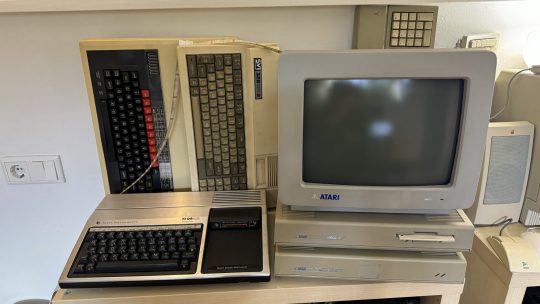
View On WordPress
0 notes
Text
The BFF and I are reminiscing about the early days of computers and the internet, and I have to share a few observations.
My first "computer" was a TI-99/4a, made by Texas Instruments (the calculator people). This was in 1983. It was similar to an Atari or Commodore-64 in that it could play games, but it could also be added on to with various hardware. My parents got hardcore into this. Aside from learning about programming, we also had a 300 baud acoustic modem - the kind you literally put the phone receiver on - and I was able to access local bulletin boards and talk to strangers from far away! V e r y s l o w l y. We later got more peripherals like a graphics card and a big old dot-matrix printer. I remember writing school papers on it.
The first computer that belonged to me was an Apple Mac LC that I got for college. It was super expensive and I still have the base somewhere, but the monitor is long gone. I went online with that thing with an external modem... I think the first one I got was a 14.4k. Yes, I did the whole AOL thing.
Internet services were preceded by these sort of walled-garden services like AOL (America Online), Compuserve, and Prodigy. I remember getting into RP forums on Prodigy (specifically for Pern and the Dragon Prince series), running up a huge bill, and getting it canceled. You could chat on these and participate in other activities like games (I remember winning a copy of one of Terry Brooks' novels on Prodigy, but there were no websites or anything like that.
For some time, when the first Internet service providers (ISPs) came into being, I worked at one, answering phones and doing some very basic tech support (literally "have you tried turning it off and on again"). I did billing as well, which was when I first learned that people just... didn't think they had to pay their bills. Three months of non-payment and their service would get cut off and they'd call in, livid. It was an experience. We also played lots of interoffice matches of DOOM and Quake, so it balanced out. I used to use my office computer to download sound clips from movies and parts of songs.
I only used Usenet a little, but it was a thriving community full of various posters and groups. My favorite group was probably alt.barney.die.die.die.
While working at the above ISP, I had to make a website so that I knew some HTML, since they actually wanted people to help customers with that. (I should add there were only like five employees there; the guy who started it up basically was using investment money from his dad. I also remember he tried to make me learn how to mess with circuit boards. I still don't know why he wanted to teach me, but no, I did not retain one single thing from that.) Anyway, I learned basic HTML, and I still have a website today that still uses exceedingly basic HTML.
Can you imagine calling Comcast today and going "yes, I'm struggling with this bit of javascript here, I expect you to help me."
No, because even if you pay them four times what you paid my ISP back then (I think it was around $30 a month for a dedicated DNS), they would tell you to look up a tutorial on youtube.
I don't remember when we switched to 24/7 connections and cable internet and broadband and everything, but I can tell you that I remember getting online, checking my email, going on IRC for a little bit, looking at websites, maybe doing some RP on a MUSH, and then logging off and shutting it down at the end of the night. We didn't expect everyone to be THERE all the time.
Although while I was still with the ISP, I used to get on PernMUSH NC first thing in the morning and sit there all day so my name would be at the bottom of the user list. Because that was a powerful status to have.
My ex and I would trade off computer time. We didn't even play games that needed to be connected to the Internet. We did other things. Can you imagine?
I downloaded So Much Shit from Napster. So. Much. (A lot of it was mislabeled garbage, too. You wouldn't believe how many crappy "parody" songs got attributed to Weird Al.) Didn't use Limewire nearly as much because it was so riddled with viruses. Damn you, Lars Ulrich.
Those days were wild. You could find the worst shit online, but also some of the best. People used Tripod and Geocities and mailing lists and Usenet, just every kind of thing to connect to each other. I had a site just for my fanfic, and I hosted friends on it and even designed their sites. Before AO3, before Livejournal, we were making it work any way we could. I still remember the Outside the Lines mailing list for comic fandom and how people would post full fics on there. And others would complain that not enough Dark Horse comics were getting fics. Some things never do change.
We also regularly got secondary phone lines so that we could use the modem and not be interrupted by phone calls, or have people scream that they'd been trying to call us for hours. Everything had to be connected by wires. If you wanted to game with your friends, you took your PC (and monitor and anything else you needed) over to their house, plugged in and had a LAN party.
Or if you just wanted to browse the Internet without your own PC, you'd go to an Internet cafe and rent one for a couple hours. Sit there, have your coffee and go online.
Everything is different these days. Everyone is connected, online, all the time, and you're practically not allowed to be disconnected. You must be available at all times. As nice as it is to get all our information quickly, I do kind of miss when the Internet wasn't so omnipresent. I could do without what social media has done to us, too. And I really miss MUDs and MUSHes. Text based games where you could RP or just wander around killing mobs.
Anyway, it's been an interesting experience growing up through all of this. I never would have imagined having a phone with all my music and the Internet on it, but they're just ubiquitous now. Strange to think of not having it everywhere I go, and WiFi for everything.
3 notes
·
View notes